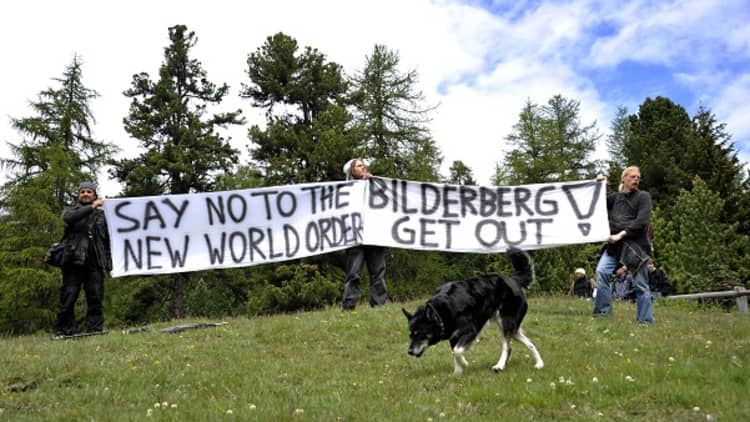
One of the world's highest-profile meetings of global political and economic leaders kicks off today, and its level of secrecy puts other global summits to shame.
The 63rd Bilderberg conference brings together a 140-strong roster of business leaders, politicians and academics for three days -- this year in Telfs-Buchen, Austria.
What really takes place behind closed doors is anyone's guess: The media can't get in, and the tight-lipped meeting is governed by rules barring anyone from spilling the beans. But here's what we know:
Who’s attending?
Hot shot business leaders like Google executive chairman Eric Schmidt will rub shoulders with the military elite, including NATO Secretary General Jens Stoltenberg and politicians like Netherlands Prime Minister Mark Rutte.
Shell CEO Ben van Beurden, Banco Santander Chairman Ana Botin, and Airbus CEO Thomas Enders were all invited, as was Ryanair boss Michael O'Leary. Policy makers including European Central Bank board member Benoit Coere will be on hand, but he won't be flanked by any US Fed counterparts.
But having little official power isn't a problem - former UK shadow ex-chancellor of the exchequer Ed Balls is headed to Telfs as well.
Andre Spicer, a Professor of Organisational Behaviour at Cass Business School, said an invite to Bilderberg is a point of pride.
Read MoreSnow business: Does Davos still matter?
"You get invited to a secretive meeting, and there's air of mystery, and a sense of being in the inner circle," and few are likely to turn that down.
So what really has tongues wagging is who isn't on the guest list, namely International Monetary Fund chief Christine Lagarde who attended in 2014. Others political heavyweights like US president Barack Obama and German Chancellor Angela Merkel won't grace the Telfs grounds either.
What’s on the agenda?
It's hard to know exactly what will be discussed, thanks to the Chatham House Rule which forbids attendees from sharing any information outside of the conference. According to Bilderberg's press release, this lets representatives speak openly amongst peers.
Very little is known about the event's agenda, but a list of key topics include "Cyber Security," "Chemical Weapons Threats," "Artificial Intelligence" and "Russia."
"Greece" also made the list, along with "US Elections," "NATO," and "Current Economic Issues."
Read MoreG7 summit: What's onthe agenda?
Without any resolutions, votes or policy statements expected from participants, Bilderberg provides a platform for opinion-formation that could later spur on domestic and international policy, Spicer said.
"Bilderberg creates what we'd call 'the ideological groundwork' behind the decisions."
"It's been fundamental for enacting policy shifts across the world and rolling out of liberal projects…(including) free market intervention."
By avoiding the public spotlight attendees can evade political sensitivity, he added.
The conspiracy mill
Bilderberg has unsurprisingly sparked a spate of conspiracy theories since its inception in 1954.
So what could happen when the world's most influential people get together?
Some suggest the group helped start the Serbian war, while others say it's an attempt at forming a "new world order" with a single global government. Conspiracy theorists also say Margaret Thatcher's career was launched as a result of the conference.
"Bilderberg's unique selling point is their secrecy," Spicer explained. Guests lists and topics are just a nod towards transparency, "but by showing a little bit, they're concealing a lot."

